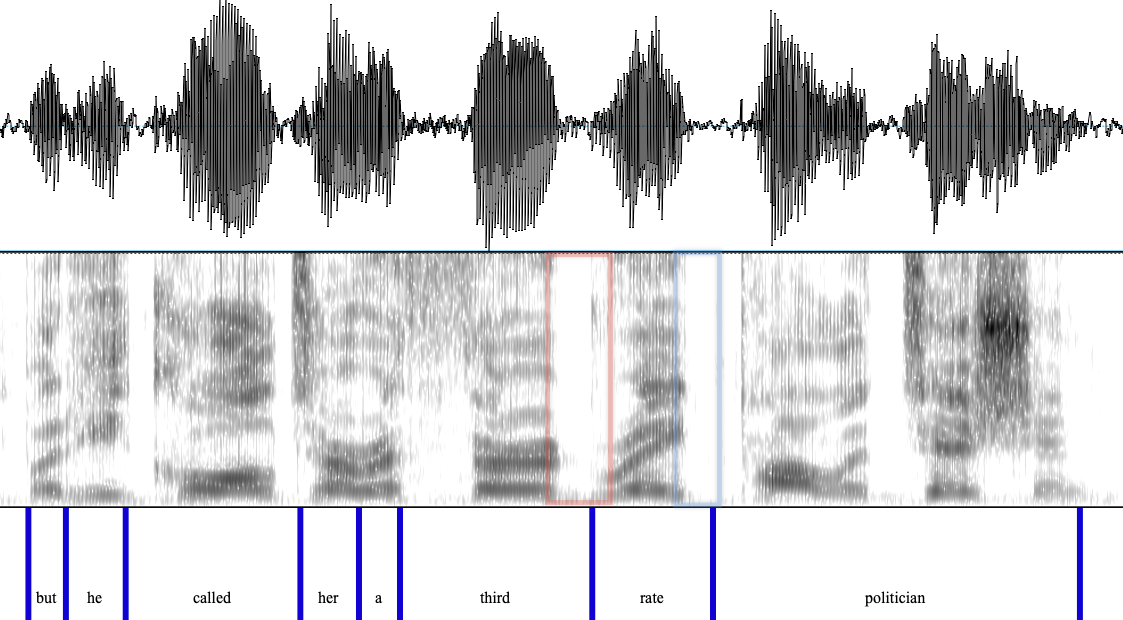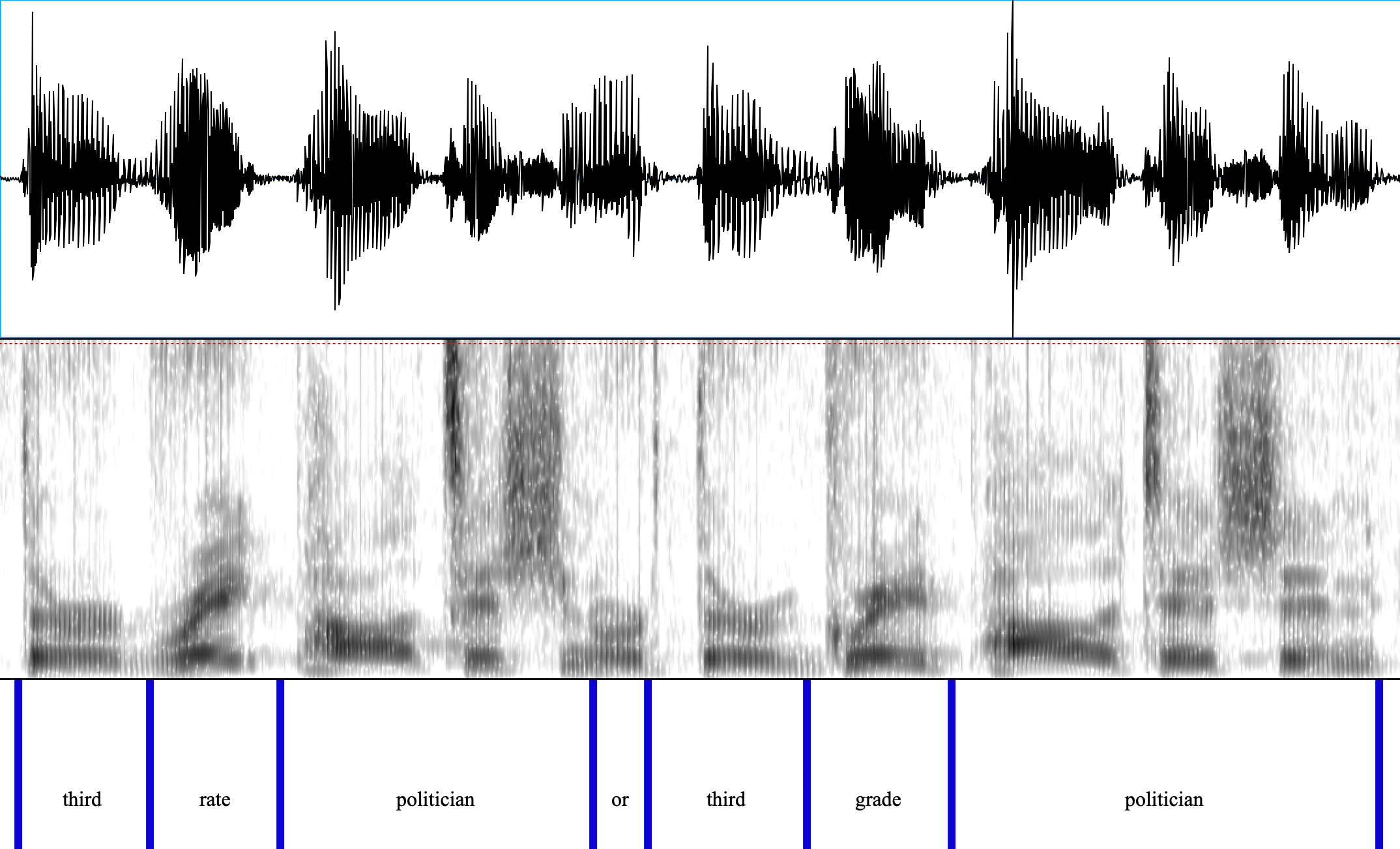Third-g?ra(d|t)e phonetics
« previous post | next post »
Recent political events have offered a lesson in the phonetic interpretation of American English, among other subjects. See "Trump disparages Pelosi at their first meeting since impeachment inquiry began, Democrats say", Washington Post 10/16/2019:
“He couldn’t handle it,” Pelosi told reporters at the Capitol, referring to a House vote earlier Wednesday condemning Trump’s decision to withdraw U.S. troops from northeastern Syria. “He just couldn’t handle it. . . . So, he just kind of engaged in a meltdown.”
Pelosi added that she is praying for Trump’s health. Pressed for more, she responded: “I’m not talking about mentally. I’m talking about handling the truth.”
In remarks outside the White House, Schumer had told reporters that Trump had called Pelosi a “third-rate politician.” Pelosi later clarified at the Capitol that Trump had called her a “third-grade politician.”
Here's what Schumer said, in context (from the video clip embedded in the WaPo story):
He was insulting
particularly to the Speaker.
She kept her cool completely
but he called her a third-rate politician,
he said that
the- there are communists involved and you guys might like that.
I mean this was not a dialogue
it was sort of a diatribe, a nasty diatribe, not
focused on the facts
The "third-rate politician" phrase itself:
The perception or memory variants "third rate" and "third grade" came up in discussions after a broadcast of Senator Pelosi's news conference. The talking heads give their best facultative disambiguation of the variants, though they seem have the attributions backwards:
Here are some audio segments and spectrograms:
And there were many other things, including
whether- uh I can't-
I don't know if it was third rate politician
or third grade politician
And so you're right that according to Senator Schumer
um
a- and Speaker Pelosi the president called her a third grade politician
there's a bit of a dispute the White House says third rate
Putting it all together, a good phonetics homework question would be
What are the phonetic cues that distinguish "third grade politician" from "third rate politician" in Senator Schumer's variety of American English? How are the facultative oppositions presented by the two CBS reporters the same or different?
Extra credit: Find other pronunciations of the same phrase(s) on the web, and compare them.
Note: the sequence
Third-g?ra(d|t)e
in the title of the post is a crude attempt at a regular expression matching either version of the phrase. I could also have used
Third-g?ra[dt]e




BZ said,
October 17, 2019 @ 3:54 pm
What's interesting is that before I listened to any of the clips, I figured the main distinction for me as a listener would be the voiced "d" in "grade" due to the high probability that the "g" could be swallowed in the "rdgr" consonant cluster. However, after hearing the second to last clip, the "g" was the main differentiator. While the "d" of "grade" was indeed voiced somewhat, had the "g" not been there, and had it been in isolation, without comparing, I could have interpreted it either way. So now I am convinced that there is some rendition which I would find fluent, but ambiguous between the two.
And both clips are dropping "d" at the end of "third" and not "g" in both "third rate" and "third grade", something I hadn't thought about. Of course, whether all of these pronunciations might have been different without the commentators explicitly contrasting them is an open question.
Also, what does "third-grade politician" mean? Are third graders running for class president or whatnot called "politicians"?
[(myl) What he said was almost certainly "third rate" — Trump is very fond of that deprecatory modifier, and never uses "third grade" in a similar sense. See "'Third (rate|grade) corpus linguistics".]
Stephen Hart said,
October 17, 2019 @ 5:22 pm
Maybe Trump got verbally confused (he's done that before) and said "third-grate politician."
eub said,
October 17, 2019 @ 11:52 pm
In Trump's defense, the regex does allow "third-grate" too, as well as "-rade".
edhall said,
October 18, 2019 @ 12:19 am
To reduce confusion, I offer "third-(grad|rat)e" as the appropriate regular expression. Thus, the alternative in the expression is "grad" or "rat." (I sometimes write RE's for a living and overmatching is definitely an issue I look out for.) In this case I'm not sure what "third-rade" would even mean.
[(myl) The OED has rade as a variant of "radius", with this puzzling citation:
?a1563 W. Baldwin Beware Cat (1584) iii. 51 By meanes that the nepe abasing Thetis swollen face, would make her to cast beyond her those rades which before the ful: the spring had caused her to throwe short.
]
David Morris said,
October 18, 2019 @ 3:47 am
Which is more disparaging?
matt regan said,
October 18, 2019 @ 10:26 am
Is this "big-league"/"bigly" II–Electric Boogaloo?
Thomas Rees said,
October 18, 2019 @ 12:58 pm
The Beware the Cat citation presumably has to do with tides: "neap", "full", “spring”, Thetis being a sea nymph, as well as mother of Achilles.
BobW said,
October 19, 2019 @ 7:08 am
So, he didn't say "third great politician?
D.O. said,
October 19, 2019 @ 10:35 am
Pelosi is, of course, not a senator, but the speaker. I remember, a previous Democratic speaker, Dick Gephardt, was often addressed as Senator. Maybe we should introduce an "honorary Senator" title for the Speaker of the House, but we are not there yet, IMHO.
Ray said,
October 20, 2019 @ 8:58 pm
where in this posting is the soundbite of pelosi saying it was "third grade"? because: facts, context, journalism yadda yadda